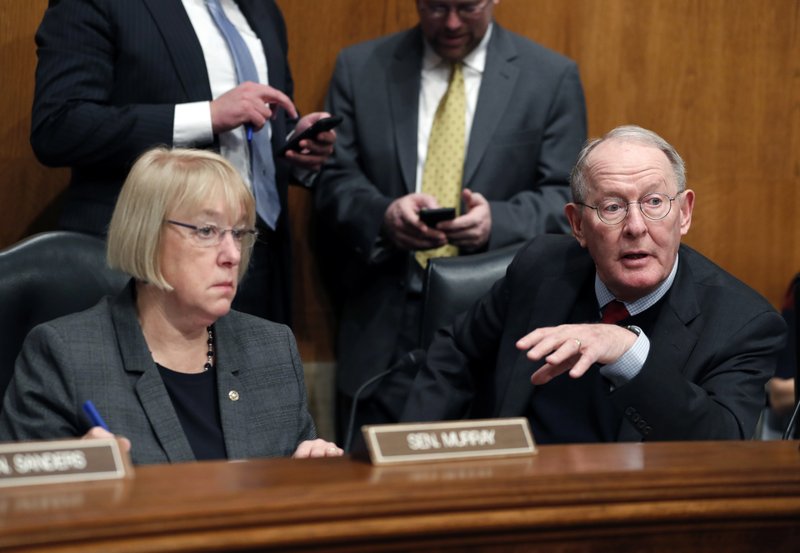WASHINGTON -- While most of Washington is fixated on President Donald Trump's firing of FBI chief James Comey and burgeoning investigations into possible connections between Trump's presidential campaign and Russia, Senate Republicans are trying to return to work on their health care bill. In closed meetings, Republicans are trying to write legislation dismantling President Barack Obama's health care law.
They would substitute their own tax credits, ease coverage requirements and cut the federal-state Medicaid program, enlarged by Obama, for the poor and disabled.
The House passed its version this month, but not without difficulty, and now Republicans who run the Senate are finding hurdles, too.
GOP senators said they're discussing a possible short-term bill if their health care talks drag on. It might include money to help stabilize insurance markets with subsidies to reduce out-of-pocket costs for low-earning people and letting states offer skimpier, and therefore less expensive, policies.
[INTERACTIVE: Compare new health care bill with Affordable Care Act]
It's unclear whether Democrats would offer their cooperation, but Republicans are talking about it.
"We've discussed quite a bit the possibility of a two-step process," said Sen. Lamar Alexander, R-Tenn., and chairman of the Senate Health, Education, Labor and Pensions Committee. "In 2018 and 19, we'd basically be a rescue team to make sure people can buy insurance."
That could mean Republicans might temporarily extend Obama's individual mandate -- the requirement that people buy coverage or face tax penalties. It's perhaps the part of the current law that Republicans dislike most. But it does prompt some people to purchase insurance, which helps curb premiums and make markets viable.
Alexander said there's a "strong bias" to address short- and long-term problems in a single bill.
[PRESIDENT TRUMP: Timeline, appointments, executive orders + guide to actions in first 100 days]
"If we can't do the real thing, we'd have to do the next best thing," Senate Finance Committee Chairman Orrin Hatch, R-Utah, said of short-term legislation.
Because Democrats oppose the repeal effort unanimously, Republicans will need 50 of their 52 senators to back their overhaul so Vice President Mike Pence's tie-breaking vote would clinch passage. GOP senators show no signs of producing a bill soon.
Time is important, especially with Trump's problems drawing lawmakers' attention. Insurance companies could grow spooked by the uncertainty and make health care markets even worse by raising premiums or pulling out.
Also, the longer it takes Republicans to write the legislation, the less time they'll have for tax cuts and other GOP priorities.
The House version would end, in 2020, the extra federal payments that states get under Obama's law for expanding Medicaid to additional people. Senate conservatives prefer to start phasing out that money next year. But 20 GOP senators come from states that expanded Medicaid and want to protect those voters, so many would rather reduce the payments over many years.
Conservatives and moderates also disagree over how tightly to cut future spending on the entire Medicaid program.
Many Republicans want to refocus the House's health care tax credits, which grow with people's ages, by boosting subsidies for lower earners. Eager to reduce premiums, many want to roll back Obama mandates such as requiring insurers to cover specified services, including substance abuse counseling, but there are questions about how far to go.
Decisions haven't been made on helping states subsidize people with costly medical conditions and keeping insurers from fleeing unprofitable markets.
Making Medicaid, the tax credits and other programs more generous than the House will cost billions of dollars. Senators will need ways to pay for that.
The Congressional Budget Office plans to release its estimate Wednesday of the House health care bill's cost and how it would affect coverage.
Congress' nonpartisan budget analyst projected in March that an earlier House version would mean 24 million additional uninsured people.
Senators will examine whether the House bill still cuts Medicaid by $840 billion over a decade and reduces taxes -- largely on higher earners and health industry sectors -- by around $1 trillion. Democrats targeted both reductions as unfair.
Also being watched is whether a number of late changes in the House bill will force the House to vote again on the legislation, which was nudged through the House by only four votes.
The budget office said the earlier House bill had $150 billion in 10-year deficit reduction. But that was before House leaders added extra money and provisions to win votes.
Congress approved special rules that will block Democrats from using a Senate filibuster to kill the health bill. To retain the filibuster protection, the bill that the Senate receives from the House must reduce the deficit by at least $2 billion, including $1 billion each from two Senate committees, over a decade.
A Section on 05/21/2017
